

Subscribe360 Member portal provides an integrated, self-service member solution
Simplify member onboarding, automate renewals and collect subscriptions with ease
Automate your finance processes, from invoicing to direct debits and online payments
Measure & increase member engagement to provide more value to your members
Advanced events & conferences management features for membership organisations
Fundraising, gift aid and donation management made simple
Our commitment to meeting client requirements is our DNA to success
Subscribe360 is built on the world’s leading CRM & ERP solution
Subscribe360 has multiple trusted partners to provide a full membership solution
Our vision is to provide the number one membership management solution
Subscribe360 is built from the ground up as a Microsoft cloud solution
Membership transformation insights with Subscribe360 & the Microsoft cloud
Subscribe360's development team configures, customises and delivers your solution
Subscribe360's support team help ensure staff get the most from your investment
Dedicated professional trainers and change management experts on-hand
Our consultancy team are the catalyst for delivering digital transformation
AvMA’s vision of reducing their manual processing to a customer-centric model
Allows data from Dynamics 365 to be synchronised with the website database
Subscribe360 was specialised to meet the specific requirements of the My PL initiative
Having RSPH's Membership, Events and Portal modules implemented together
The new website is based on the Subscribe360 members' portal
Subscribe360 members' portal was deployed to underpin the new membership system
Get in touch with us to discuss your project without any obligations
Get in touch with us to discuss your project without any obligations
Direct Debit management can be a labour intensive and error-prone process. With SmartDebit and Subscribe360 – powered by Dynamics 365, we have looked to make this a simple, fully automated, end-to-end process. In this blog, we'll look at how this integration works and how it can save you time whilst improving the accuracy of Direct Debit collections.
A new Direct Debit is created in Dynamics 365, either as part of the join online process or manually in the CRM interface. Regardless of how the user signs up, a new Direct Debit record will be created in the CRM. The Direct Debit details can be verified in Dynamics 365 via the SmartDebit integration, and if successful, a new Payer record is automatically created in SmartDebit.
Example:
In the example below, the Direct Debit is created in Dynamics 365 and verified.
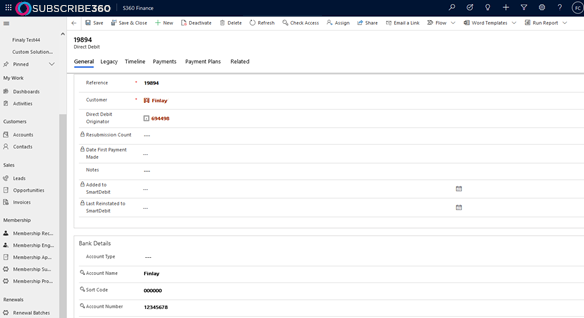
In the SmartDebit management portal, we can see the Payer has been created.

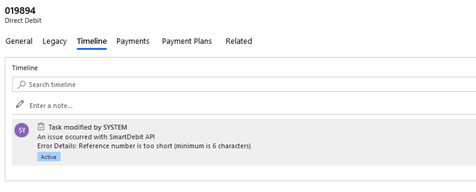
Updates to the Direct Debit details are also automatically handled. If the Direct Debit is active and bank details are updated in Dynamics 365, the Payer details will be updated in SmartDebit.
Example:
Account number updated in Dynamics 365, and the change is automatically reflected in SmartDebit.
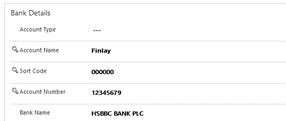

If the Direct Debit is cancelled in Dynamics 365, the Payer will be automatically marked as cancelled in SmartDebit.
Example:
Direct Debit cancelled in Dynamics 365.
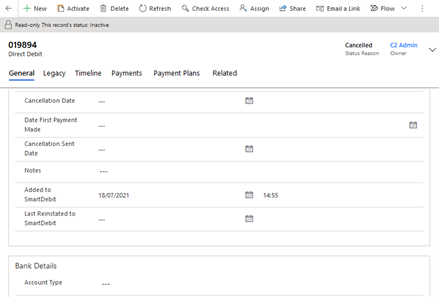
The corresponding Payer is cancelled in SmartDebit

If a Direct Debit with the same reference number, e.g. member number, is reinstated in Dynamics 365, the Payer will be reinstated in SmartDebit.
Example:
A cancelled Direct Debit is returned to “First Collection” status in Dynamics 365.
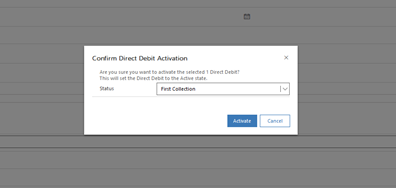
This results in the Payer being reactivated in SmartDebit.

Direct Debits that are due for collection will be included in an AUDDIS collection file. This file is generated automatically by Subscribe360 and transferred automatically to SmartDebit for processing.
Example:
The collection file has been generated by Subscribe360 and is available in the “Documents” tab.

This document used an example CSV as per below (note 2 payers for collection for £49.95 and £50.05).

The user runs the Flow “Send Collection File to SmartDebit” to start the transfer process from Dynamics 365 to SmartDebit.

In SmartDebit, we can see the 2 new collections (as per the CSV) are scheduled for the relevant Payers:

If there are any errors/issues with the requested collections, a ‘Task’ will be shown on the Direct Debit batch timeline with supporting details.
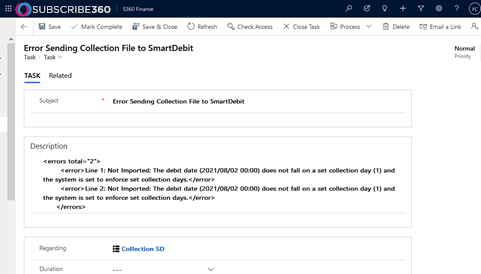
All Direct Debit reports that are available in SmartDebit will be automatically processed via Subscribe360. In addition, scheduled tasks run once a day to look for new ARUDD (returned collections), ADDACS (amended and cancelled Direct Debits), DDICA (indemnity claims), and AUDDIS (advice) reports.
Direct Debits that failed to collect will be informed via the ARUDD (Automated Returned Direct Debit) file. SmartDebit will make this available for download a few days after the collection file has been processed.
Subscribe360 will automatically pick up any new ARUDD files from SmartDebit and will look to match the return to the relevant Direct Debit Transaction, updating it with the reason that the record was returned. If appropriate, the relevant Direct Debit instruction will also be cancelled, e.g. Payer Deceased, Instruction Cancelled etc.
New ARUDD reports are looked at daily by a scheduled task. If there is a new report in SmartDebit, then an Automated Return of Unpaid Direct Debits (ARUDD) Direct Debit batch is automatically created in Subscribe360 with ARUDD’s records per returned Direct Debit.
Example:
ARUDD report is available in SmartDebit.
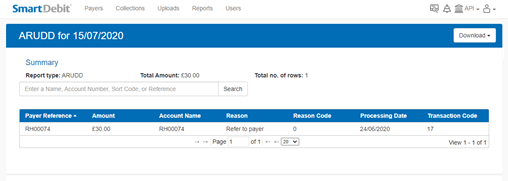
If the file has not already been processed, then it will be picked up by the scheduled task and a Direct Debit Batch created. The supporting ARUDD document will be transferred to a SharePoint document location for the batch. The ARUDD batch is then automatically processed in the normal manner within Subscribe360:


Members or clients with existing Direct Debits may change banks or may choose to cancel their instruction. If they do, then SmartDebit will make this information available in an ADDACs (Automated Direct Debit Amendments & Cancellations) file, which is typically downloaded for action. With Subscribe360 integration, the file is automatically transferred to Dynamics 365, and the relevant Instructions will be automatically amended.
ADDACS – Amendment and cancellation files are also picked up via scheduled task that runs daily.

A corresponding ADDACS Direct Debit Batch with supporting document will be created in Subscribe360. Then, the ADDACS is processed in the normal manner within Subscribe360.


Direct Debit guarantee claims are notified via the DDICA (Direct Debit Indemnity Claims) file. SmartDebit will make this file available for download, but Subscribe360 will automatically look for any new or updated DDICA files on a daily basis. These files are then automatically transferred to Dynamics 365, and a new Direct Debit Batch is created with a separate DDICA entry for each claim in the file. A Task is also created for action by the relevant team and will be made available on the Direct Debit Dashboard for action/follow up.
This makes it simple to see who has made a claim and ensures that staff can take the appropriate action following the claim.
Example:
DDICA – Indemnity claim files are also picked up via scheduled task that runs daily.

The file is picked up and creates a Direct Debit Batch of type DDICA. Then, the supporting XML document is uploaded to a related SharePoint location.


The file processing is started automatically, and the DDICA records are created directly against the batch. After that, tasks will be created for action, e.g. to create a refund record against relevant payment/invoice.
Subscribe360 provides not only comprehensive Direct Debit management facilities as standard, but also supports seamless integration with the leading Direct Debit bureau SmartDebit. This ensures that processing Direct Debits can be a quick and error-free process.
Contact us today to see how Subscribe360 with Dynamics 365 and SmartDebit can transform your Direct Debit handling